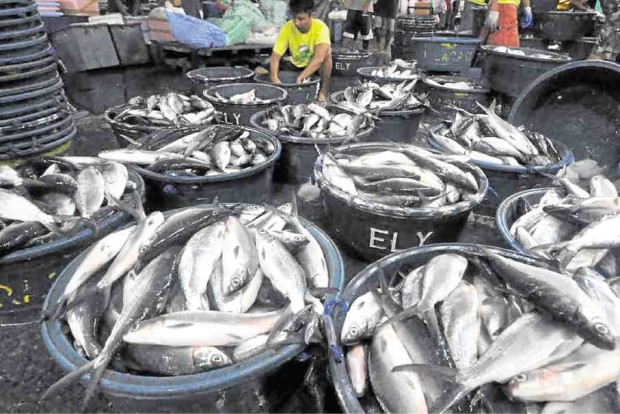DA says Pangasinan to fill fish supply gaps as demolition of pens continues in Laguna de Bay

A worker sorts newly harvested “bangus” (milkfish) at the Magsaysay fish market in Dagupan City. —WILLIE LOMIBAO
LINGAYEN, PANGASINAN—With a fish sufficiency level of more than 200 percent, Pangasinan province could fill the fish production gap that would result from the demolition of fish pens in Laguna de Bay by 2018.
The province has been supplying 140 metric tons of fish, mostly “bangus” (milkfish), to Metro Manila each day, which account for 60 percent of the total volume of fish being traded in the area, said Nestor Domenden, Ilocos region director of the Bureau of Fisheries and Aquatic Resources.
Last week, Agriculture Secretary Emmanuel Piñol said Pangasinan would be tapped as an alternative source of fish supply for Metro Manila, as the demolition of fish pens in Laguna de Bay begins.
The lake produces 400,000 MT of milkfish and tilapia annually, supplying 70 percent of the fish requirements of Luzon and parts of the Visayas, government records showed.
Of the 160,000 MT of fish produced yearly in Pangasinan, about 90,000 MT are bangus, Domenden said.
Article continues after this advertisementAccording to the Philippine Statistics Authority, Pangasinan produced an annual average of 106,857.37 MT of bangus from 2013 to 2015, making it the country’s leading bangus producer. The province also produces 10,820.81 MT of tilapia every year.
Article continues after this advertisementStabilizing prices
Without the bangus and tilapia from Laguna de Bay, Pangasinan’s share in the total fish volume traded in Metro Manila is expected to increase, Domenden said.
This, he said, will benefit fish farmers because prices of their produce will also increase.
At present, bangus has an average wholesale price of P105 a kilogram and an average retail price of P125 a kg. Tilapia has a wholesale price of P80 a kg and a retail price of P106 a kg.
Piñol said bangus grown in Pangasinan would easily sell because of its distinctive taste. “When you say [Pangasinan] bangus, people love it. Even foreigners look for it because it made its name not only here but also abroad,” he said during a recent visit here.
There are unoccupied areas in the province’s mariculture areas which could serve as new production areas, Domenden said, adding that one investor wanted to relocate its 200 fish cages to Pangasinan. “And this is only one corporation,” he said. —GABRIEL CARDINOZA